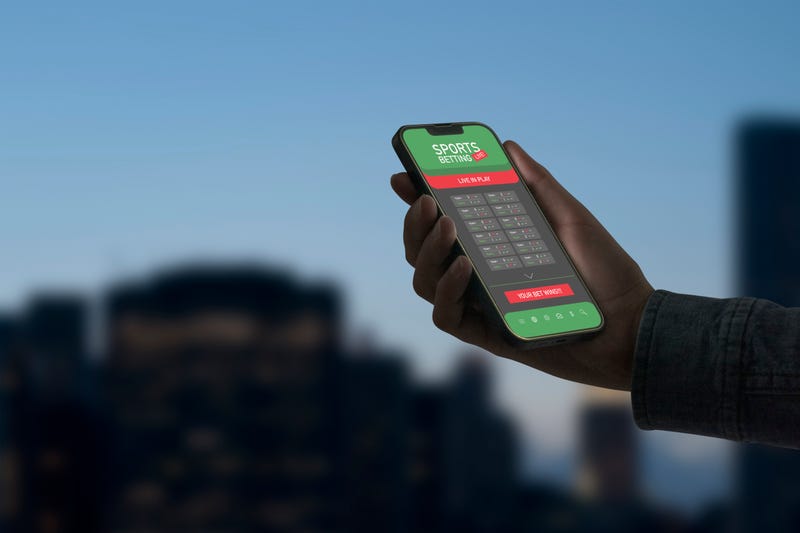
Buffalo, N.Y. (WBEN) - After a full year of mobile sports betting being legal in New York State, Gov. Kathy Hochul announced on Friday the state has collected more than $709.2 million in taxes on such bets, a figure that tops the nation.
An additional $200 million in licensing fees have also been collected, generating a total of more than $909 million in revenue.
The state also announced its total mobile sports wagering handle reached an astronomical $16,595,732,482, and generated a total net revenue to education of $709,247,358.

"The numbers are mind-boggling, and well-beyond anything that the state was projecting originally," said Ken Kruly from PoliticsAndStuff.com. "When you look at the background of the whole thing, it's kind of understandable. The state, a couple of months ago, published information that said that on any given Sunday in the fall, there have been 5.7 million wagers placed on online betting in New York State, which is an incredible number, and certainly explains why the revenues are so high."
While some people may see the state's announcement as maybe a flex, but as Kruly points out, they simply are making note of the new source of revenue for the state that has grown substantially.
"The intention, at least, using the revenues is for education, so I'm sure there'll be a link to that," Kruly said. "But I think that they're just showing that the state is producing more revenue, which, hopefully, reduces the burden on other things that require tax money."
With most of the revenue generated by the state going towards education, two things are set to happen:
"Either there's an increase in spending for education, or money from taxes or other things, that would otherwise fund education, are available to do something else with," Kruly points out. "That's the interesting question, what do they do with all this excess money that's coming in? When we see the state budget coming out in a couple of weeks or so, we'll have a better idea of what the plan is to use the money for."
Back in late March shortly after the stadium deal was announced for the Buffalo Bills, the Seneca Nation Council approved a resolution with New York State referring to the Nation’s outstanding gaming compact dispute. The resolution from the Council calls for the transfer of $564,842,625.20 from an account in which compact-related funds have been held.
As it turns out, Gov. Hochul said her intentions for using the compact funds from the Seneca Nation would go towards the new Bills stadium. The state has agreed to contribute $600 million to go towards the construction of the new stadium, and later take over operations from Erie County once the facility is constructed.
While the state may have been able to wait to make any sort of announcement until the mobile sports betting figures came out, Kruly feels one way or another, the money from the Seneca Nation would have found its way into the state's coffers.
"The Governor chose to designate it for the state's responsibility for the construction of the stadium. It's sort of using the money for one thing or another," Kruly said. "They could have used the sports betting money for the stadium, I suppose, but they also had that $600 million that the Senecas had to provide."

While Friday's announcement from the state comes as a show of revenue from the political angle, it comes as a concern for those who work daily in an attempt to help those with addiction issues with regards to gambling.
"What we know with disordered gambling is if you increase opportunity, you're going to increase pathology. We have certainly increased opportunity," said Matthew Jost, a clinical social worker specializing with gambling. "It's concerning, because gambling of sports is so tightly associated with sports gambling and our heroes. I mean, particularly lately, our heroes are football players, are sports figures. Our heroes are our coaches and our mentors. Most people do very well, it's that 3-5% I'm concerned about that they're predisposed, they could have problems with disordered gambling."
Jost admits there is a bit of a double standard with some people like parents and educators teaching the youth how to do things like Super Bowl squares, brackets during March Madness. However, those same people wouldn't dare teach the younger generation how to cook meth or mix a perfect alcoholic drink.
"Sports are king in Western New York and in America," Jost said.
When it comes to the more than $16 billion spent on mobile sports betting in New York in 2022, Jost says it comes as no surprise to him the state leads the nation and have broken records.
"Gambling is the great American pastime, no question about it. The mantra is 'ante up'. It's not baseball more, it's not 'batter up'. Its 'ante up', for sure. People love to gamble," he said. "For the 95% of people, it's not a problem. It's done recreationally. It's the people that's 3-5%, that would have gambling problems. And again, we have to have education prevention out there. It's so incredibly important. And again, most people are going to be OK."
At this time in today's world, Jost doesn't know any business that is doing better than the gambling business, whether it's with mobile sports betting or those heading to the casinos. He believes the numbers will only continue to grow, and grow exponentially.
"I imagine New York State, the numbers are putting out there, we are leading the way in gaming and gambling, make no mistake about it. I just hope that we're going to lead the way in treatment programs and recovery programs, and education, as well. That's my concern."
As Jost hopes treatment programs can keep up with a potential increase in gambling problems for people, his biggest concern going forward is with the youth of New York State and the nation.
"Young people, college-aged people, gambling is so prevalent," Jost said. "Buffalo, New York is a sports town, and we've never been more of a sports town. At this moment, our sports team is on everybody's mind, as everything that happens on our sports team is, and I think gambling is not seen differently from other addictive behaviors. It seems like, 'Maybe I'll just throw money on the game, make it interesting.' That concerns me about where that could go to, what you're alluding to with higher numbers into the future, because we'll have that double standard of addictive behavior."
For anyone that needs help with a gambling problem going forward, Jost definitely encourages people to seek professional services.
"You can see every sports in the media, you can call the hotline for gambling problems, or crisis services can give you the number and the of Mental Health will give you treatment programs and professionals that deal with sports gambling. Because it's the hidden disease," Jost said. "We don't see it the way we see other drug or alcohol addictions, it's very hidden. And plus, we have people that can get some credit or get some money from somewhere to gamble, and they can gamble with a swipe, We've just never had that before, again, this technology of our smartphones, etc."


